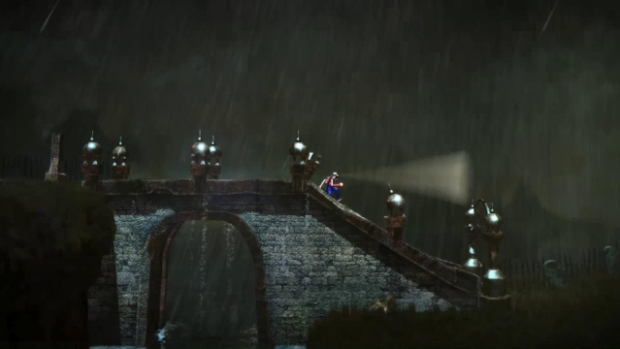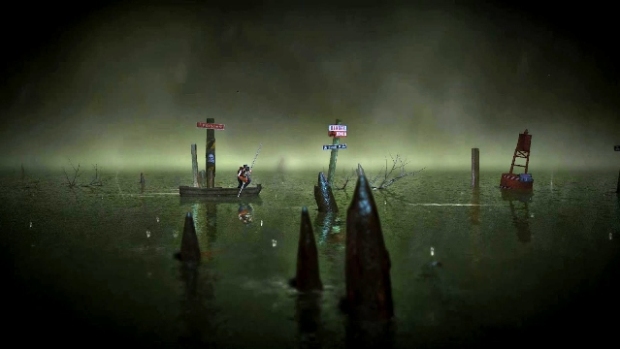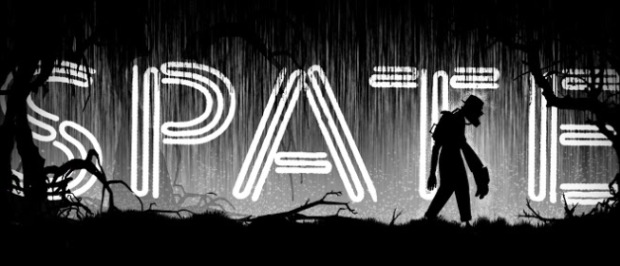It may not seem like the most logical career progression: moving from working in the Jim Henson creature shop – home of The Muppets – to spending three years creating a video game about disappearance, death and depression. But that is the path that Eric Provan has taken, with a little help from that friend of the first-time developer, Kickstarter. The title in question is psychological platformer, Spate.
Spate sees you take on the role of Detective Bluth, a broken man. When we join him, he is investigating the disappearance of a rich businessman in a mysterious location known as the X Zone. Once a popular vacation spot, a strange fog descended on the island ten years ago and a spate of missing persons led to the area becoming condemned. As if that wasn’t worrying enough, Bluth is also haunted by depression, following the death of his daughter and divorce from his wife.

This platformer is certainly no Super Mario; it deals with real-life emotional issues – even if the setting may not look like the real world. But the setting and visuals are very much up for interpretation by the individual. As a result of his depression, Bluth turned to alcohol to solve his problems, which accounts for some of the other-worldly settings and imagery that is encountered throughout the game, though little is ever made entirely clear. Spate contains the gameplay mechanic whereby players can actually choose to take a drink of Absinthe whenever they please.
This actually provides you with the benefits of faster movement and higher jumps, but comes with the more realistic side effects of blurred vision and and the world slowly spinning. Sadly, the choice to drink or not to drink has no real effect on the development of the game – apart from one choice much later in the narrative. It simply serves as a power-up of sorts, whioh makes tricky platforming sections a bit easier. It would have been interesting if the mechanic had more bearing on the outcome of the title, but it is an intriguing different option for players, and is left entirely up to you how you want to make use of it.
The visuals are very striking throughout, and illustrate the descent into alcohol-induced madness well – beginning fairly close to reality, and developing into stranger and stranger locales as Bluth progresses. This results in some very dark, miserable environments, as well as some unusual psychedelic ones too. Coming from a visually creative mind such as Provan’s, the graphics were likely to be strong point of Spate, and the rain-drenched oddness creates a strong atmosphere of foreboding and isolation.

You aren’t completely isolated throughout your journey, though, meeting a friendly robot and several hallucinated characters along the way, but this is not a major element of the title. All told, even though there are several irritating platform sections that you will have to retry several times, you never feel like the gameplay is actually the main thrust of the game. Check-pointing is generous so frustration doesn’t really get a chance to set in, and the action consists simply of bouncing on springboards, riding air currents and making use of a double-jump feature. Seemingly by design none of this is very challenging – don’t get me wrong, it is all solid platforming action – but it allows you to focus almost entirely on the story.
And it is a compelling one, as more back-story and information is revealed as you progress. Things take a very interesting twist part-way through as well, and this revelation – combined with the strong voice acting for the protagonist – lead to you relating to and empathising with Bluth. The story is certainly not a happy one and is much closer to real-life than most video games ever get – dealing with strong personal emotions that could potentially resonate with a lot of players. This is only heightened by the use of melancholy, string-driven music that adds to the somber mood perfectly.

There is a choice to make at the end of the game, but after the journey you have been through with Detective Bluth – no matter how short it was – there will be few of you who won’t have connected with the character and his plight, leaving only one option you could possibly choose. Perhaps that is the greatest success of the game: that although Spate leaves the outcome of its tale to its players, the strength of emotion created makes that choice for you. This isn’t a perfect game by any means, and at times is barely a game at all, but as a psychological experience, it is unlike most other titles out there.
VERDICT: Spate isn’t a game that is terribly concerned with action-packed or challenging gameplay. It isn’t going to keep you busy for very long either, taking only a couple of hours at most to play through. But the visuals, audio and narrative combine very nicely to create a strong sense of atmosphere and identity – one which is likely to remain with you long after you finish playing.

VERY GOOD. An 8/10 is only awarded to a game we consider truly worthy of your hard-earned cash. This game is only held back by a smattering of minor or middling issues and comes highly recommended.
Review code provided by publisher.







